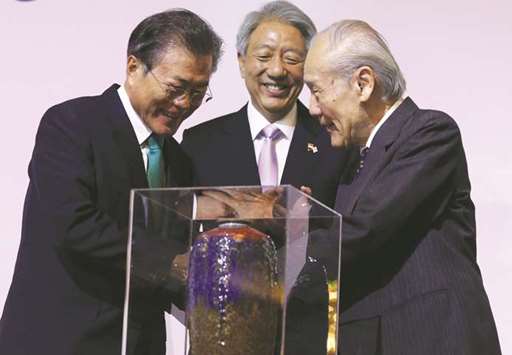South Korean President Moon Jae-in said yesterday he is confident a diplomatic thaw between Washington and Pyongyang will continue, despite “bumps and bruises” on the path to denuclearising the Korean peninsula.
Moon was speaking during a state visit in Singapore, where last month US President Donald Trump and North Korean leader Kim Jong-un met during an unprecedented leaders’ summit.
Kim committed to a nuclear-free North Korea at the end of the convivial meeting, but tensions resurfaced in the following weeks as representatives of both countries began to flesh out the deal.
“There will indeed be bumps and bruises along the way to achieve complete denuclearisation in the Korean Peninsula. But I believe we are in a completely different position (compared to) what happened in the past,” Moon said.
US Secretary of State Mike Pompeo received a chilly reception last week after travelling to Pyongyang for denuclearisation talks.
While Pompeo said the talks were in good faith, Pyongyang’s take was staunchly negative, warning the future of the peace process was being jeopardised by “unilateral and gangster-like” US demands for its nuclear disarmament.
North Korean officials failed to attend a planned meeting on Thursday to discuss returning the remains of American soldiers killed during the 1950-53 war that divided the Korean peninsula.
Pyongyang has long signalled a desire for denuclearisation, which it sees as a lengthy process of multilateral disarmament on the entire Korean peninsula rather than the unilateral dismantling of its nuclear arsenal.
Ties between North and South Korea have rapidly thawed in recent months following an April summit between Moon and Kim.
Moon said yesterday that Seoul was willing to build an economic community with its neighbour once Pyongyang has shown it no longer has nuclear weapons.
On Thursday the US accused North Korea of breaching a UN sanctions cap on refined petroleum by making illicit transfers between ships at sea, according to a document seen by Reuters, and demanded an immediate end to all sales of the fuel.
The United States submitted the complaint to the UN Security Council North Korea sanctions committee.
The North Korea UN mission did not immediately respond to a request for comment on the US accusation.
North Korea relies on imported fuel to keep its struggling economy functioning.
The United States said that as of May 30, 89 North Korean tankers had brought in refined petroleum products illicitly obtained in ship-to-ship transfers this year.
The United States did not broadly say which countries it believed were illicitly providing North Korea with refined petroleum.
But it does mention one case of a ship-to-ship transfer involving a Russian-flagged ship and one case involving a Belize-flagged ship.
Reuters in December reported that Russian tankers had supplied fuel to North Korea by transferring cargoes at sea.
The 15-member Security Council capped refined petroleum product exports to North Korea at 500,000 barrels a year in December, down from a previous limit, adopted in September, of 2mn barrels a year.
According to the Security Council North Korea sanctions committee website, only Russia and China have reported legitimate sales of some 14,000 tonnes of refined petroleum to North Korea in 2018.
“These sales and any other transfer must immediately stop since the United States believes the DPRK has breached the...
refined petroleum products quota for 2018,” the United States said in a document submitted to the committee, using an acronym for North Korea.
The United States provided a list to the Security Council committee of the 89 North Korean tankers and a few select photos, seen by Reuters.
“If fully loaded at around 90% laden, DPRK tankers have delivered nearly triple the 2018 quota at 1,367,628 barrels,” the United States said.
It asked the North Korea sanctions committee to issue an urgent note to all UN member states notifying them that North Korea has breached the refined petroleum cap and order an immediate halt to all transfers.
The UN Security Council has unanimously boosted sanctions on North Korea since 2006 in a bid to choke off funding for Pyongyang’s nuclear and ballistic missile programs, banning exports including coal, iron, lead, textiles and seafood, and capping imports of crude oil and refined petroleum products.
In March the council blacklisted dozens of ships and shipping companies over oil and coal smuggling by North Korea.

South Korea’s President Moon Jae-in is presented a token of appreciation at the ISEAS 42nd Singapore Lecture in Singapore yesterday.
